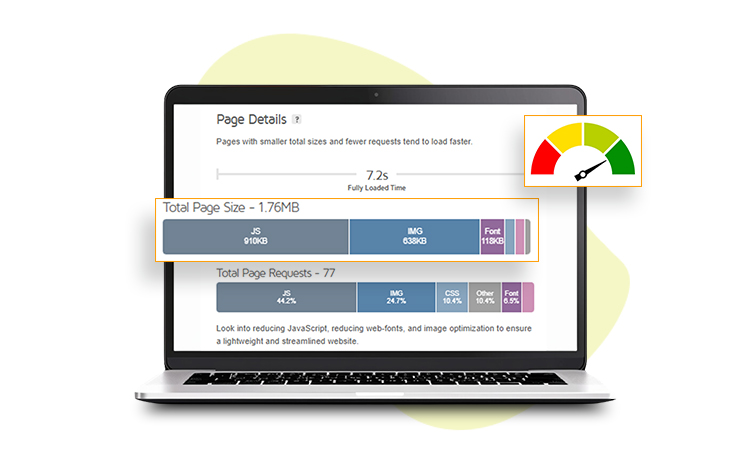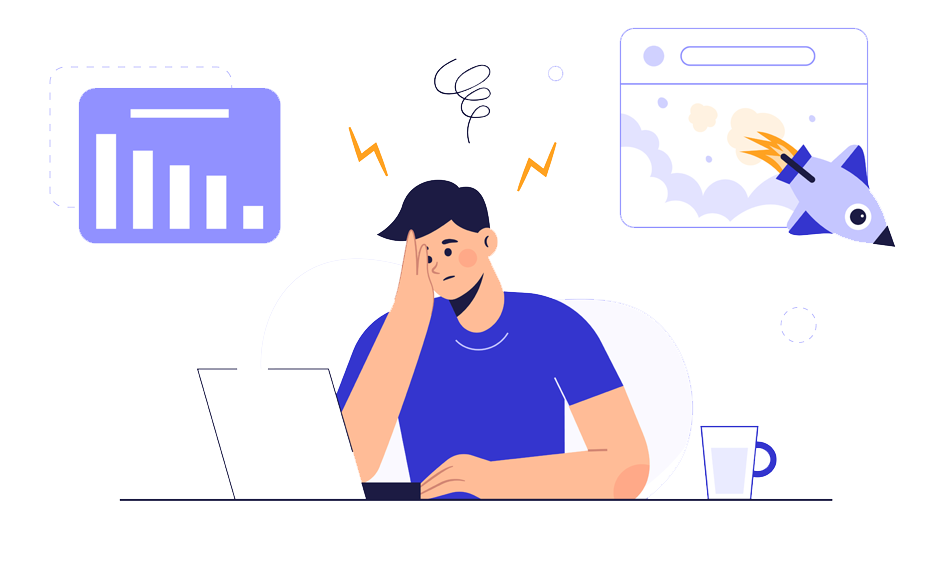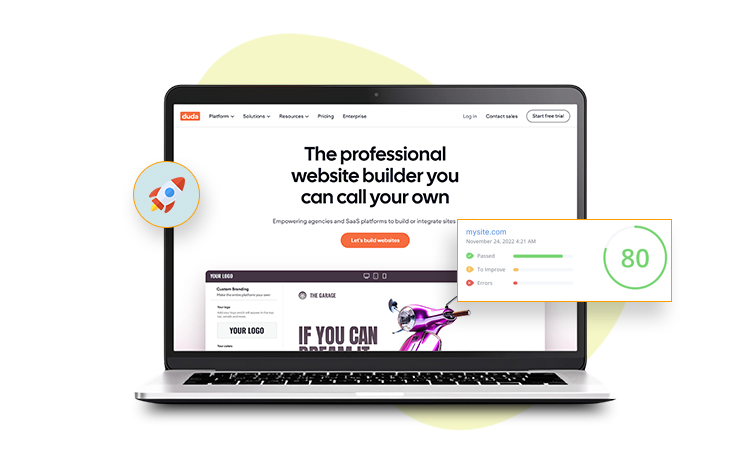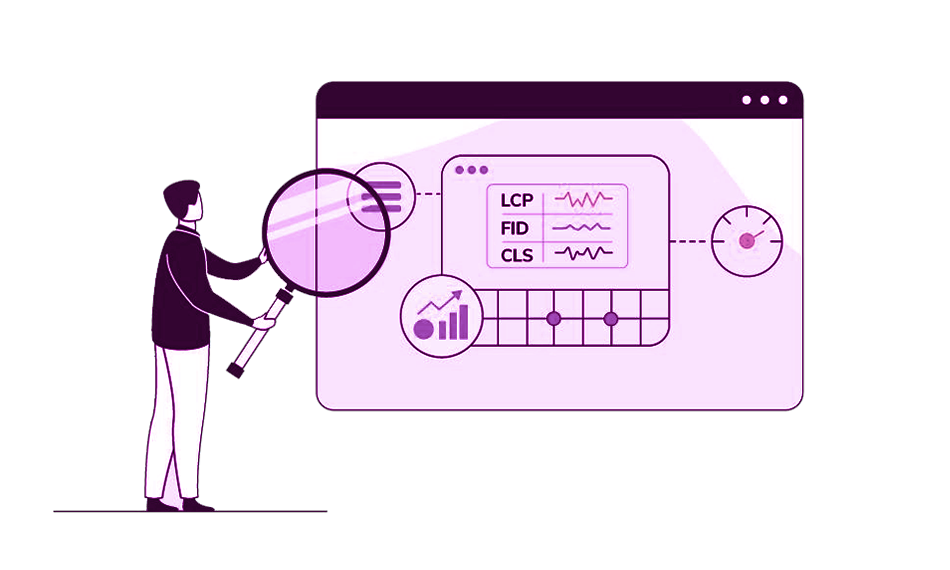TL;DR: Web page weight is the total size of all files required to load a webpage. Heavier pages lead to slower page load speed, poor user experience, and lower SEO rankings. Optimizing images, scripts, fonts, and third-party resources can significantly improve website speed and performance across desktop and mobile devices.
Most websites don’t struggle with speed because of hosting or traffic alone, they slow down because they’re carrying too much. Large images, heavy scripts, fonts, and third-party tools all add up, increasing web page weight and quietly hurting performance.
As page weight grows, page load speed drops, interactions feel sluggish, and mobile users are hit the hardest. With Google relying on real-user signals like Largest Contentful Paint (LCP) and Interaction to Next Paint (INP), page weight has become a key factor in website speed optimization and search visibility.
In this guide, we’ll explore how web page weight impacts site performance and SEO, and what you can do to reduce page size for faster, smoother experiences across devices.
What is Web Page Weight or Page Size?
Web page weight refers to the total size of a webpage when it is fully loaded in a web browser. This size is commonly measured in kilobytes (KB) or megabytes (MB) and contains all the resources that make up the page, including HTML, CSS, JavaScript, images, videos, and other media files or resources.
In simpler terms, think of web page weight as the “weight” that your page carries when it travels across the internet. Just as a heavier package takes longer to deliver, a larger webpage requires more time to load.
Why Does Page Size Matter?
Page size is important for several reasons. The primary one is its impact on user experience. A smaller page size generally leads to faster loading times, which is essential for retaining visitors. Research shows that users abandon sites that take longer than a few seconds to load. Faster pages enhance user satisfaction, which encourages longer visits and reduces bounce rates.
Page size also affects mobile users, who may have slower connections or data limits. Optimizing page size assures that content is accessible to a wider audience, improving engagement across devices.
If we look at it from an SEO perspective, search engines prioritize fast-loading pages in their rankings. A smaller page size can lead to better visibility in search results, which drives more traffic to the site.
Page Weight vs Page Load Time: What’s the Difference?
Page weight and page load time are closely related, but they are not the same. Page weight refers to the total size of all files required to load a webpage, while page load time measures how long it takes for that page to become usable for visitors. A heavier web page usually takes longer to load, but load time is also influenced by factors such as network speed, server response time, caching, and device performance.
On mobile devices and slower networks, heavy page weight significantly amplifies delays, making optimization essential for both website speed optimization and overall performance optimization.
| Aspect | Page Weight | Page Load Time |
|---|---|---|
| Definition | Total size of all page resources (HTML, CSS, JS, images, fonts, media) | Time taken for a webpage to load and become usable |
| Measurement | Kilobytes (KB) or Megabytes (MB) | Seconds (s or ms) |
| Primary Influencers | Images, JavaScript, CSS, fonts, videos, third-party scripts | Page weight, server response time, network speed, caching, device |
| Direct SEO Impact | Indirect (affects speed-related ranking factors) | Direct (affects Core Web Vitals and rankings) |
| Mobile Impact | Heavy pages consume more data and load slowly | Load time increases sharply on slower mobile networks |
| Optimization Focus | Reduce file sizes and unnecessary resources | Improve delivery, caching, and rendering efficiency |
| Relationship | Heavier page = higher risk of slow loads | Load time increases as page weight increases |
How to Check Your Web Page Size?
Understanding your web page size is the first step in optimizing performance. Here are some tools and methods to check.
- Google PageSpeed Insights: This free tool not only measures page speed but also provides insights into page size and recommendations for improvement.
- GTmetrix: It analyzes the performance of your web page and offers detailed reports on load time, page size, and resource breakdown.
- WebPageTest: This tool provides comprehensive testing options, including loading time and size metrics from various locations and devices.
- Browser Developer Tools: Most web browsers come equipped with developer tools (accessible via right-click > Inspect) that allow you to monitor network activity, including the size of each resource loaded on the page.
What Elements Contribute to Determining Page Size?
Webpage size is determined by the total weight of all resources loaded on a page, including HTML, CSS, JavaScript, images, videos, fonts, and third-party scripts. Each of these elements adds to the overall page weight and affects load speed –
1. HTML: The backbone of your page, HTML structure impacts its weight based on the amount of content it holds and the complexity of its markup.
2. CSS: Stylesheets control the appearance of the website. Larger stylesheets or multiple CSS files can significantly increase page size.
3. JavaScript: Scripts enhance interactivity and functionality but can add substantial weight, especially if they are poorly optimized or not minified.
4. Images: Visual content often constitutes the bulk of a page’s weight. High-resolution images can increase load times if not properly compressed.
5. Videos: Embedding videos can greatly increase page weight, particularly if they are not optimized for web delivery.
6. Fonts: Custom web fonts add to the page size, particularly if multiple font weights or styles are used.
7. Third-Party Scripts: These include ads, tracking codes, and social media widgets. Each adds weight and can slow down loading times.
Benefits of Creating a Smaller Page Size?
Creating a smaller page size offers multiple advantages for website performance, user experience, and SEO, which are explained in detail below.
1. Faster Load Times
Smaller page sizes reduce the amount of data that needs to be downloaded, leading to quicker load times. This enhances user satisfaction and reduces bounce rates, as users are less likely to abandon a site that loads quickly.
2. Improved Mobile Experience
With an increasing number of users accessing websites on mobile devices, smaller page sizes ensure that sites perform well even on slower mobile networks. It is crucial for maintaining engagement and providing a positive experience across various devices.
3. Enhanced SEO Performance
Search engines prioritize fast-loading websites. By optimizing page size, you can improve your site’s ranking in search results, potentially increasing visibility and organic traffic.
4. Lower Bandwidth Usage
Smaller pages consume less bandwidth, which can be particularly beneficial for users with limited data plans or those in regions with slower internet connections. This not only improves accessibility but can also lead to cost savings for both users and website owners.
5. Easier Maintenance
Websites with smaller page sizes often have cleaner and simpler code. It can make maintenance easier, as there are fewer elements to manage, which results in reduced development time and costs.
6. Better User Engagement
Faster loading times and a more responsive design can improve user engagement. When they get a flawless experience, users are more likely to interact with content, explore more pages, and return for future visits.
7. Increased Conversion Rates
Websites that load quickly and efficiently tend to have improved conversion rates. Whether it’s signing up for a newsletter or completing a purchase, users are more likely to take action when their experience is smooth.
How Web Page Weight Impacts Core Web Vitals
Core Web Vitals are Google’s primary metrics for measuring real-world user experience, and web page weight directly affects how well a site performs across these signals. As Google continues to rely on mobile-first indexing and CrUX (real-user) data, heavier pages are more likely to fail Core Web Vitals, especially on mobile devices and slower networks.
Largest Contentful Paint (LCP)
The Largest Contentful Paint measures how quickly the largest visible element loads, often a hero image or banner. Heavy images, uncompressed videos, and oversized hero sections increase page weight and delay rendering, resulting in slower perceived load times.
Interaction to Next Paint (INP)
INP (Interaction to Next Paint) evaluates how responsive a page feels during user interactions. Large JavaScript bundles, excessive third-party scripts, and heavy execution block the main thread, causing delayed interactions, an issue amplified on mid-range and mobile devices.
Cumulative Layout Shift (CLS)
CLS measures visual stability during loading. Images without dimensions, large font files, and dynamically injected content increase page size and cause layout shifts, leading to a frustrating user experience.
Why This Matters in 2026
With Google prioritizing real-world performance data, optimizing web page weight is essential for consistently passing Core Web Vitals. Lighter pages load faster, respond quicker, and remain visually stable, directly supporting better rankings, engagement, and conversions.
What Are The Different Ways to Reduce the Page Weight?
Reducing page weight is challenging but not impossible. Here are some strategies that can help boost your website speed by reducing the page size.
- Optimize Images: Use modern image formats like WebP or AVIF, which provide high quality at smaller sizes. Tools like Image Optimizer Pro can compress images without reducing their quality.
- Minify CSS and JavaScript: Remove unnecessary whitespace, comments, and characters from your code. Tools like CSSNano for CSS or UglifyJS for JavaScript can help in this process.
- Implement Lazy Loading: The technique defers loading images and videos until they are visible in the user’s viewport, reducing initial load times.
- Use Content Delivery Networks: CDNs store copies of your website’s resources in various geographical locations, allowing users to access data from a server closer to them and speeding up load times.
- Limit the Use of Plugins: Excessive plugins can make your website heavy. Evaluate which ones are essential and remove the rest.
- Optimize Fonts:Limit the number of custom fonts and their variations. Consider using system fonts, which load faster.
- Combine Files: Where possible, combine multiple CSS or JavaScript files into one to reduce the number of HTTP requests.
- Use Gzip Compression: Enabling Gzip compression on your server can reduce the size of your HTML, CSS, and JavaScript files.
What is The Ideal Page Size For Your Website?
The ideal page size for a website ranges between 1 and 2 MB. Keeping it under 1 MB is optimal for faster loading times, which enhances user experience and boosts SEO. You must focus on compressing images, minimizing scripts, and utilizing efficient coding practices for a lighter page. A light page ensures quicker access across devices, which reduces bounce rates and provides higher engagement.
Conclusion
Understanding and optimizing web page weight is a foundational part of building fast, reliable websites. When page size is kept under control, sites load quicker, feel more responsive, and deliver a smoother experience across both desktop and mobile devices, factors that directly influence user behavior and search visibility.
By applying the right optimization strategies, it’s possible to reduce unnecessary page weight, improve Core Web Vitals, and support long-term SEO performance. With the help of website performance optimization tools such as Website Speedy, even non-technical teams can simplify the process and maintain consistently fast-loading pages without ongoing complexity.
FAQs
Q1. What is a good page load time on a website?
A. Good page load time is typically under 3 seconds; faster is better for user experience and retention.
Q2. How do you measure the performance of a website?
A. Website performance can be measured using tools like Google PageSpeed Insights, GTmetrix, or WebPageTest. These tools analyze load times, responsiveness, and optimization opportunities.
Q3. What is the ideal image weight for a website?
A. The ideal image weight varies, but aiming for 100KB or less is a good practice to balance quality and load speed without sacrificing user experience.
Q4. Does page size affect SEO?
A. Yes, larger page sizes can negatively impact SEO due to slower load times, which may lead to higher bounce rates and lower rankings.
Q5. Are longer pages better for SEO?
A. Longer pages can be beneficial for SEO if they provide valuable, in-depth content. However, quality and relevance are more important than length alone.















































